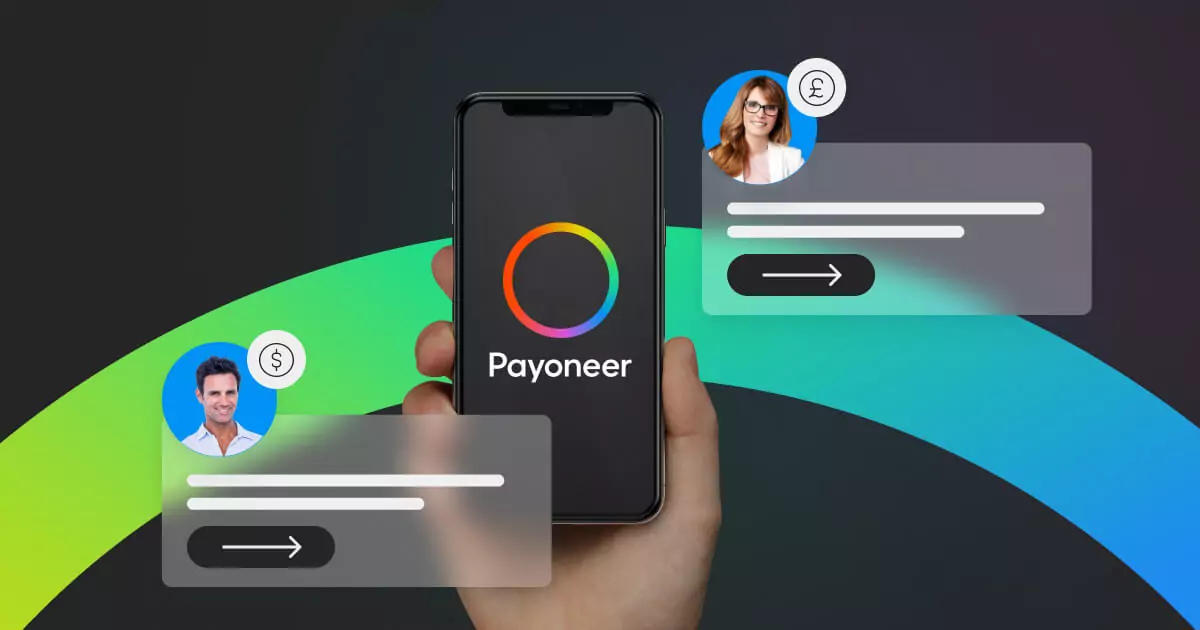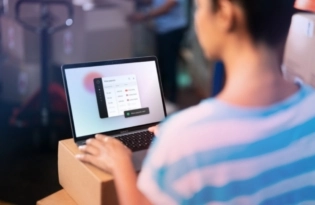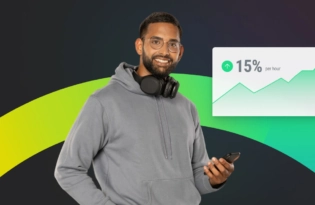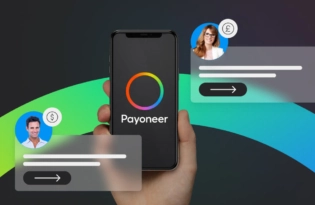Online Payments: what are they, types and benefits
As more people embrace digital transactions, online payments have become vital for businesses. By the end of this article, you’ll have a clear understanding what online payment solutions for businesses are available for seamless online transactions. How they work, and their importance in today’s digital landscape.

Do you know that the online payments sector is one of the largest and fastest-growing markets in the financial space?
With more people preferring to make and receive payments digitally, online payments have become necessary for successful business operations in today’s digital landscape.
The good news is online payments services giants like Payoneer empower businesses by providing comprehensive solutions for online transactions. Payoneer facilitates local and international online payments, enabling businesses to expand their reach and increase their revenue potential while lowering their payments costs.
After reading this article, you’ll understand what online payments are, how they work, and what they mean for you and your business.
What are online payments?
Online payments are the exchange of money via the internet.
It could be an electronic payment to purchase goods and services online, like customers buying items from ecommerce sites. Or any other transfer of funds online, such as paying bills, settling debt, issuing online payment loans, or making monetary donations.
Either way, funds or currency moves electronically from the sender’s account through a well-designed online payment ecosystem into the receiver’s account.
This mode of payment is becoming increasingly popular as it offers convenience, speed, and security for buyers and sellers.
There are several methods of making online payments. Some popular methods are:
- Credit or debit cards
- Digital or eWallets
- Online transactions via banking apps or a bank website
- Online payments systems linked to both the sender and receiver’s account
- Same-day wire transfer
- Mobile payments (79% of consumers make payments from their mobile device)
- Cryptocurrencies
Payments made online can be:
- One-off: as is the case for many ecommerce transactions
- Recurring: e.g., when you subscribe to various services like Spotify
- Installments: some sellers allow buyers to pay for goods or services over some time, for instance, like we see in payday loans online
How do they work?
The exact process of how online payments work depends on the specific method being used to make the payment.
However, different entities and services must be present to facilitate the payments. Some of these include:
The customer or cardholder
The business owner – often called a merchant.
The acquirer – this term refers to a bank that processes payments made via cards on behalf of the business owner or merchant. The acquiring bank routes the transactions to the issuing bank through a specific card network such as MasterCard or Visa.
The entity holding funds a customer intends to use for their online purchase – this could be the customer’s bank, digital wallet, or an online payment solution provider.
If the customer uses a card to make payments, this holding entity is the card issuer. That is, the financial services provider that issued the card to the customer or cardholder.
Organizations that allow specific data or information to flow as needed for any online payment to take place. A few of these essential services include:
- Payment gateway – encrypts cardholder’s sensitive card info and directs the payment request to the payment processor.
- Payment processor – connects merchants to the acquiring bank, enabling them to receive the credit or debit card payment.
- Payment providers or payment service providers – are companies that provide payment gateway and payment processor services.
The transaction process
Generally, several steps occur for the money to flow from the sender or buyer to the receiver or seller.
First, the customer initiates the transaction by selecting the items for purchase, adding them to the merchant’s shopping cart, and clicking the buy button.
Then, the merchant captures the order details and sends them to the payment processor, where the customer fills in their payment information.
A secure payment gateway will encrypt the customer’s sensitive financial information before the payment processor forwards it to the acquiring bank.
The acquiring bank sends the info to the card networks, which communicate with the cardholder’s issuing bank.
Then the issuing bank authorizes or denies the online payment request depending on several factors, including the availability of funds. If the payment goes through, funds get transferred from the buyer’s account to the seller, automatically updating each party’s funds balances.
The issuing bank will reply to the transaction’s results in the same way it received the request. That is, back to the card networks, then the acquirer, then the payment processor. Finally, the merchant confirms receipt of payment.
The customer also receives a confirmation of their purchase, and the transaction is complete.
That’s a summary of an online payment flow for one-off payments made through a credit or debit card. Often, the process is seamless and takes place within seconds.
You can simplify it further by partnering with an online payment service provider. Most of these services will streamline how your business accepts online payments by providing services like gateway, processing, and acquiring all in one.
Check out our article on online payment services to learn more about how online payments work with a payment service provider like Payoneer.
Types of online payments
Several types of online payments give consumers different options for making their purchases online. The flexibility they offer is part of the reason online transactions continue to grow in popularity.
Here is a list of online payment methods for small business users, contractors, and freelancers:
Credit and debit cards
Credit and debit cards are among the most common forms of online payment.
Both cards link to the account of the cardholder but work in different ways. When you use a debit card, the funds are deducted when you make a payment using that card. Credit cards allow you to make payments up to a pre-set limit. You then get billed once a month to pay off the amount you spent.
Most sellers accept credit or debit cards as an online payment method. So, customers can use their cards to purchase goods and services from several places, including websites, apps, and other online services.
eWallets
eWallets are electronic or mobile wallets that allow customers to store funds in a secure online account. They facilitate frictionless payments as buyers can use these funds to make payments online.
There are three main types of eWallets, namely:
- Open wallets
- Semi-closed wallets
- Closed wallets
Some online service providers allow you to connect eWallets to their platforms. Read this article on accessing funds using online eWallets to learn how to set your business up for continued success with Payoneer.
Bank transfers
Bank transfers are a secure way to transfer funds from one bank account to another. Most people use this type of payment for large purchases or international transactions.
Cryptocurrency
Cryptocurrency is a virtual currency that acts as money and can be used to make payments online. Even though Cryptocurrency is just taking its first baby steps, and there are only a few use cases in which you can use it for online payments, currencies such as Bitcoin and Ethereum are becoming increasingly popular as they offer low transaction fees and fast transaction times.
Third-party payment services
This online payment method involves using a third party to facilitate how the buyer and seller send and receive payments online.
In this case, the third party acts as a middleman who ensures the online exchange between the buyer and seller happens smoothly.
These may include mobile and online services, which users connect their bank accounts to, then initiate online transactions as needed. The third party allows funds to flow from the user’s bank account to the relevant party.
Overall, different methods of online methods work well for various businesses. Read this guide on payment methods to gain insight into online payment methods that could work well for your business.
Security considerations for online payments
Security is one of the top reasons why the online payments sector thrives.
Stakeholders, like online payment service providers, take several measures to ensure your account is safe and secure. And your customers’ financial information remains protected from online identity theft, cyber-attacks, or other fraudulent activities.
Some of the most common security considerations include:
Secure sockets layer (SSL)
A secure Sockets Layer (SSL) is an online protocol that promotes safe browsing by encrypting data sent over the internet.
It helps protect sensitive information, such as credit card numbers, passwords, and other personal information, from being intercepted by malicious third parties.
Always look for the “HTTPS” in the URL of the online payments platform you work with to ensure their connection is secure.
Two-factor authentication
Two-factor authentication is an additional layer of security that requires customers to enter a code after entering their primary password.
Customers who’ve activated this security feature receive the code via their mobile phone or email address to complete a transaction.
The extra security makes it harder for any malicious party to gain unauthorized access to your personal or business accounts.
Payment tokenization
Payment tokenization is a process that replaces sensitive payment information with a unique token.
Customers can use the token for future transactions without re-entering their payment information. It offers protection against fraud and data breaches.
Biometric authentication
Biometric authentication is a security feature that uses the customer’s unique physical characteristics, like fingerprint or face, to verify their identity online.
It’s one of the most surefire ways to protect your account against fraud and unauthorized access.
Secure payment gateways
Secure payment gateways encrypt customers’ financial information to ensure all online payments get processed safely.
They encrypt sensitive data like card numbers and codes, increasing protection against fraud and data breaches.
PCI compliance
PCI compliance is a set of security standards, usually 12, which all businesses operating online must follow when handling customers’ credit card information.
These standards guide how the business accepts, processes, stores, or transmits users’ credit card information. A few of these rules include:
- Installing and maintaining a firewall to restrict connections to untrusted networks
- Encrypting cardholder’s data, especially during transmission across public networks
- Using and updating antivirus software regularly, among others
Data encryption
Data encryption is a process that scrambles data to the point only the intended recipient can read and understand it.
The process helps protect sensitive information from getting intercepted and used for malicious purposes.
Benefits of using online payments
Using online payments, particularly for digital consumer commerce transactions, is beneficial to both the buyers and the sellers. These benefits have been the backbone of many successful online businesses.
Security
The robust security measures most online payment systems employ give businesses and customers the peace of mind they require to transact online.
You can rest easy knowing that several safety protocols safeguard your account from hackers and other malicious activities. And your customer can purchase their items or services freely with the assurance that proper encryption secures their financial information.
Always show your customers how safe it is, for them, to transact with your business online. It’ll make them trust you more and increase your sales.
Efficiency
Online payments are swift, often immediate, and unrestricted by geographical boundaries. They eliminate manual admin work, improving almost all business operations.
Convenience
By providing online payment options, you give customers a convenient way to purchase goods and services while enhancing their shopping experience.
Customers can shop and buy their items from the comfort of their homes with a few clicks of a button.
If you accept credit card payments, you give your customers the option to buy products on credit and pay later. This option makes credit card payments one of the most widely used types of online payments, despite putting the cardholder into short-term debt.
Research shows that online payments made through credit cards will increase from approximately $1.7 trillion in 2019 to nearly $1.82 trillion in 2024. Consider adding credit card payment if you haven’t, to benefit from its growth potential.
Contactless option
Contactless payments make it easy to buy goods and services. Users hold their smartphones near a POS terminal, and the transaction gets processed automatically. The funds are transferred to the seller over the network that processes and facilitates the transaction.
Customers can also opt for contactless payment methods such as QR codes and one-time passwords (OTP). This is certainly the best online payment method to avoid the need for physical interaction.
How is Payoneer beneficial for online payments?
Payoneer is among the leading global payment service providers in the market today. It offers a range of features and services, making it easy for businesses and individuals to send or receive payments online.
Some of the key benefits of using Payoneer include:
International payment capabilities
Being a cross-border payment service, Being a cross-border payment service, Payoneer enables businesses to request payments in 190+ countries, while supporting multiple currencies: USD, EUR, GBP, CAD, AUD, JPY and CNH. In addition, conversion to CZK, PLN, RUB and VND is available for tax payment purposes (subject to availability).
This means that you can conduct transactions with customers and partners from across the globe without losing money on exchange rate fees. You can also hold various currencies in one place.
Secure transactions
Payoneer uses advanced security measures to protect customer payment history data and prevent fraud.
It is PCI-compliant and includes two-factor authentication, data encryption, and account monitoring for suspicious activity.
It also complies with several anti-money laundering regulations and provides up-to-date fraud detection to all clients.
Fast and convenient
Payoneer powers fast and convenient online payments. Account holders can easily send and receive payments, and funds are typically available in the recipient’s account within a few days.
Multiple account types and low fees
Payoneer offers several account types for business and freelancers: Receiver account and a Payer account.
The fees associated with these accounts are generally low and transparent, making it easy for businesses and freelancers to budget for online payments.
Payoneer also provides several local banking solutions like paying suppliers in 190+ countries and multiple currencies (as mentioned earlier) as well as paying other Payoneer users.
Integrations and API
The system’s API allows businesses to integrate their platforms with Payoneer’s payment processing system.
This makes it easy for businesses to automate payments and manage large volumes of transactions, while integrating with their accounting software such as QuickBooks. It also increases the effectiveness of your business operations and improves cash flow.
Good customer support
Payoneer provides good customer support and dispute resolution processes to their account holders. Any issues or questions get resolved fast through chat and chatbot options, or the resource center,
Access online payments with Payoneer
With its international capabilities, secure transactions, and low fees, Payoneer simplifies and transforms how businesses operate online.
There are several ways of receiving payments to ensure you always get your money on time. You can:
- Send payment requests directly from your account once you finish a job.
- Get virtual bank details and share them with the client.
- Connect with Payoneer’s 2000+ partners and receive your funds into your account.
It’s also the number one online payment solution choice for many individuals and businesses due to its cost-effective pricing structure. Business owners keep their operating costs low and profit margins high with all the modern solutions for making and receiving online payments.
Frequently asked questions:
Yes, Payoneer is a secure platform that uses the latest encryption technology to protect your data and payment history. It also offers fraud protection and dispute resolution services to ensure secure payments.
Yes, there are fees associated with using Payoneer. These include transaction fees, currency conversion fees, and withdrawal fees. Learn more.
Yes, there is a maximum amount you can send with Payoneer. It depends on the payment method used and your account type.
Payments get processed within 1-2 business days. But this varies depending on the payment method used.
The minimum amount you can send with Payoneer is 1 USD. However, additional fees may apply for transactions below a certain amount.
Related resources
Latest articles
-
Made in India for the World: The State of Indian Cross-Border eCommerce
The Indian eCommerce market has grown significantly in the last few years. As a result, many cross-border businesses have undergone a fast-paced digital transformation and contributed to surpassing the government-set $400 billion target of trade within a single year.
-
Defying the odds: How Ukrainian businesses thrive during war
One year post-war, Ukraine’s businesses adapt and thrive amidst adversity. Entrepreneurs showcase resilience, reflecting national tenacity. Many diversify, venturing into e-commerce and digital realms. Despite hurdles, 44% of SMBs aim for growth, with 36% hiring. Their grit underscores Ukraine’s enduring spirit amid challenges.
-
What Are The Best Payment Options For Freelancers?
Freelancers offer flexibility and expertise without the overhead of traditional employees. However, processing invoices and payments for international freelancers can be a complex and time-consuming process. To work with freelancers effectively, it’s crucial to understand the available payment options for freelancers and how to best keep on top of accounting and invoicing.
-
An 8-point Checklist for Finding the Best Payment Provider
There’s huge potential to expand into ASEAN markets. But only for online sellers that accept local payment methods. Finding a trusted payment solution can be a worry and a challenge. Use this checklist to vet potential payment partners. With the right payment support, the sky’s the limit!
-
How to bill your international clients
Want to learn how to bill international clients when you’re based in the Philippines? In this article we spoke to three leading business owners who shared their tips to working successful international work. Learn how they collect payments and more below.
-
How to nail your direct-to-consumer payment strategy
Asia-Pacific offers massive potential for DTC ecommerce. But cross-border payments can be a headache. We share an actionable strategy for DTC payments that’ll remove DTC payment hazards and expand your business with ease. What are you waiting for?












